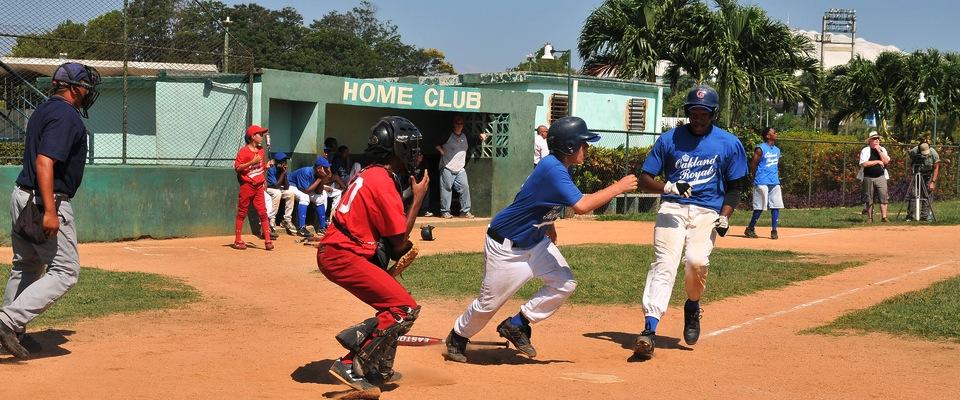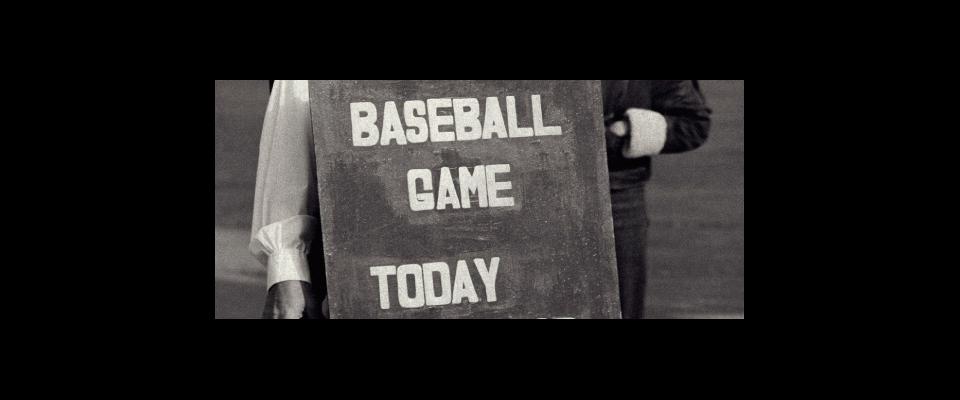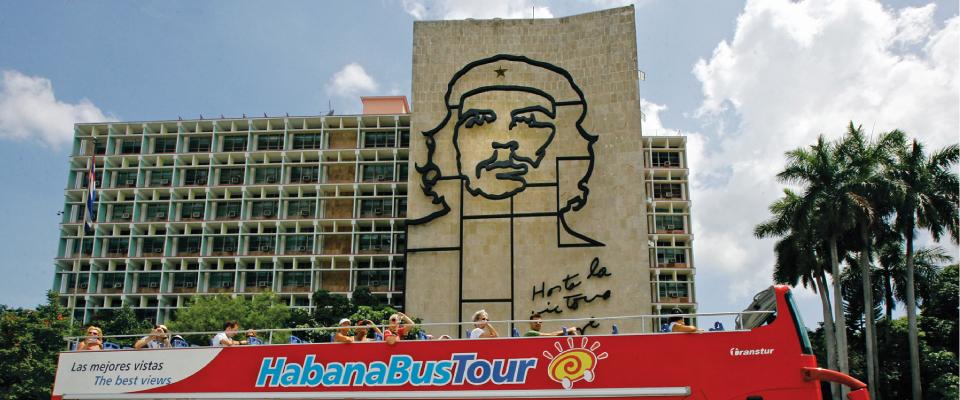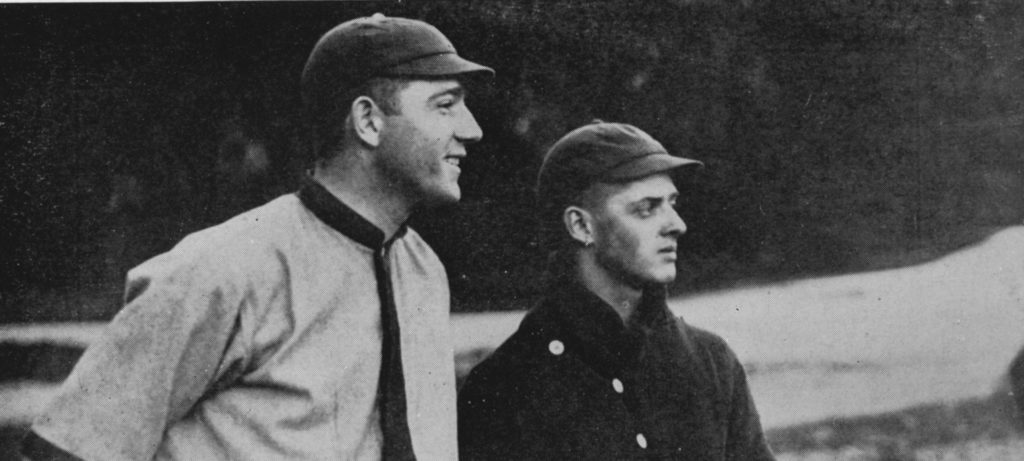There are men of vision, and there are men of vision about men of vision. This is a story about both kinds of men, and about a movie, and about kids, and baseball.
If Hollywood were to make a movie about the movie, the opening scene would be in a blue-collar bar in Berkeley, two men having a beer. One of the men is Eugene Corr. He is wearing a hipster beret and workingman’s clothes. Gene looks what he is, a documentary filmmaker who graduated from Cal back in the days of ideals and dreams.
It is 2007, and from the conversation we learn that Corr has just returned from an illegal trip to Cuba. True to his rebellious Berkeley roots, he went to Cuba just because he was in a pissed-off, screw-the-authorities state of mind.
We learn that Corr, while in Cuba, stumbled upon a sandlot baseball game. An old man was coaching dozens of kids. The kids listened to him with profound respect. The old man had devoted his life to teaching baseball, and more, to these children, and he earned the equivalent of $14 per month.
Back in 2004 there was a drive-by shooting across the street from the Bryants’ home in the West Oakland neighborhood known as Ghost Town. Four kids were shot. One of them, a 15-year-old neighbor, died in Roscoe’s arms.
Corr was moved because the old man reminded him of his late father, a longtime baseball coach and life mentor to street guys in Richmond back in the ’50s and ’60s. Gene tells his drinking buddy, “I went so far to find something so familiar. It was like my father had come back as an Afro-Cuban.”
Gene Corr, filmmaker, has returned from Cuba determined to create a documentary film about the Cuban coach, Nicolas Reyes. But a crucial element is missing from the concept in Corr’s head.
“Where can I find an American coach like this old man in Cuba?” Corr asks his pal. Without a word, the other man picks up a copy of that day’s San Francisco Chronicle lying on the bar and hands it to Corr. The paper is open to the sports page, to a story by one Scott Ostler about an Oakland couple. The man and his wife started a rag-tag baseball team in one of the city’s most crime-ridden neighborhoods and, against huge odds, are pulling kids off the streets and onto the diamond.
Corr reads aloud the last paragraph of the story, where this ghetto coach is explaining the team’s nickname: “‘I named them the Royals, because I see these kids as young kings and queens in training. I see them as future kings of industry, of business, of the community.’”
Corr drains his beer and says, “Man, I’ve got to find these Oakland Royals and take ’em to Cuba.”
And he did just that. He pulled off a miracle and made a film about those two coaches and their kids, and about that life-changing trip to Cuba. He titled it Ghost Town to Havana. It’s almost ready.
For Eugene Corr and the film cooking in his head, Roscoe Bryant was the missing link. What filmmaker with Berkeley DNA would not fall in love with Roscoe Bryant and his story?
“The first rule of filmmaking,” Eugene Corr says, “is you don’t spend any of your own money on the movie.” He funded much of the trip by taking out a home equity line of credit.
Back in 2004 there was a drive-by shooting across the street from the Bryants’ home in the West Oakland neighborhood known as Ghost Town. Four kids were shot. One of them, a 15-year-old neighbor, died in Roscoe’s arms.
Roscoe and his wife Lehi (LAY-hi) vowed to do something to take kids—including their own three—off the streets. The Bryants had no money, coaching experience, time (she was a grammar school teacher; he worked with disabled adults), equipment, adult help, or even a place to play.
“We didn’t have nothin’, really, but kids,” Roscoe said.
Soon the kids had a baseball team. So what if these Oakland Royals made Charlie Brown’s All-Stars look like the New York Yankees? This wasn’t really about baseball. It was life. The Royals held team sleepovers in sardine-can conditions, and held homework sessions with Lehi. They were taught team baseball. Kids who had spent their lives learning that you can’t depend on anyone were learning to depend on their Royals teammates, and on the Bryants.
Roscoe Bryant, like Nicolas Reyes, reminded Corr of his father. “My father was fierce but very supportive, and challenging,” he remembers. “When a kid does something good, you challenge him to do more. It’s a real art, and Roscoe has the instinct for it, and so does Nicolas.”
Most of Bryant’s future kings and queens had never been outside of Ghost Town until he and Lehi began hauling them to exotic locales like San Francisco. Bryant became obsessed with Corr’s idea of taking the Royals to Cuba. See the world, expand your horizons, expand your dreams!
“Roscoe pushed,” Corr says in the film. “He sees one of his main roles as just getting kids off the little postage stamp they live on, the little piece of gang turf.”
But the dreamed-of trip was simply impossible, until…
The day Obama was elected, Bryant phoned Corr and said, “We’re going to Cuba!”
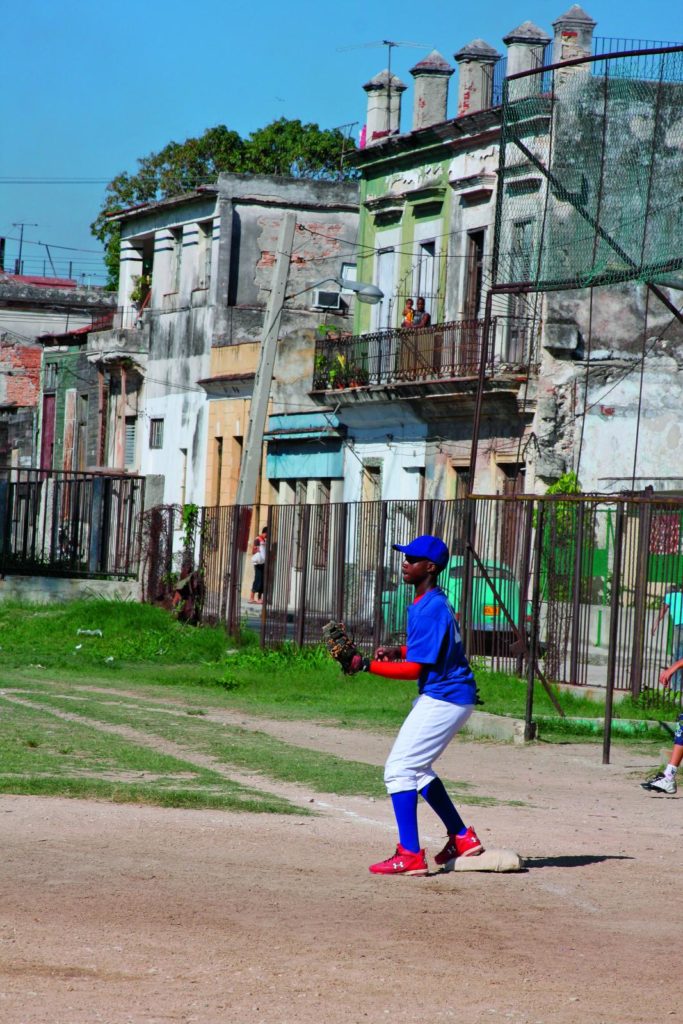
Trips to Cuba were now legal, but there were major hurdles—like money. Corr got a couple of grants but needed more. “The first rule of filmmaking,” he says, “is you don’t spend any of your own money on the movie.” He funded much of the trip by taking out a home equity line of credit.
“I’m the filmmaking equivalent of Roscoe,” Corr says.
More problems loomed. Roscoe caught Lehi having an affair, and their marriage ended after 23 years. Roscoe blamed himself for spending too much time and money on his Royals. His enthusiasm for the trip waned, and he discovered that he had no passport. Corr was about to sadly pull the plug on the trip and the film, when Roscoe phoned and said, “I’m going.”
Gene Corr grew up in Richmond, far from the college track. He got married at 18 and began a cycle of factory jobs and layoffs, during which he took junior college courses. In one factory, he met a documentary filmmaker—and that gave Gene the bug.
He joined a Marxist film collective in San Francisco, made a documentary, and then decided to go back to school. His mom and dad had both graduated from Cal and that had always been his goal, although it took him 12 years to get there, “when I was old enough to appreciate it.” At Cal he became enraptured with the academic atmosphere, studying under professors such as Leon Litwack, whose Been in the Storm So Long: The Aftermath of Slavery won a Pulitzer Prize for History in 1980.
Since graduating in ’81, Corr has been in film. One of his documentaries, Waldo Salt: A Screenwriter’s Journey, was nominated for an Academy Award in 1991. He has done production work on Hollywood films, most notably Bull Durham. And since his first trip to Cuba, his obsession has been Ghost Town to Havana.
Most of the Royals, raised in what is essentially a war zone, have emotional issues. Roscoe Bryant serves as an emotional triage nurse.
“There has to be some way to make what Roscoe does sustainable,” Corr says, explaining his goal for the film. “That volunteer model works in a stable working-class community or in an affluent community, but the model just can’t work in the inner city, not in a big way. There are heroes like Roscoe who make it work, I don’t know how, but there has to be some way to fund and support much more of that.
“We’re going to try to use the film to make a campaign to fund stipends for coaches.… We can’t have volunteer coaches working for nothing, so is there some middle ground that we can find and occupy that will get more kids playing? They’ll all play, given the opportunity.”
The trip from Ghost Town to Havana, as seen in Corr’s film, is a rich cultural exchange, but it’s no pleasure cruise. Most of the Royals, raised in what is essentially a war zone, have emotional issues. Roscoe Bryant serves as an emotional triage nurse.
One boy, who has already lost his father to street violence, learns during the trip that his stepfather has been shot and killed. Eddie Heard, the biggest kid on either team, has a volcanic temper. The Cuban coaches fear injury to their kids from line drives hit by the monstrous Heard, so they insist on using a rubber ball for Eddie’s at-bats. He storms off the field and pouts, an angry and lost soul. Another player, Monte, argues with Bryant and leaves the field. Bryant follows and tries to tell him he can’t abandon his brothers, but then loses his temper and tells Monte, “Get the fuck out of here!”
But there is much beauty and love in the film. The Havana kids and the Oakland kids bond wonderfully. When it’s time for the Royals to leave Cuba, there are tears.
The film has plenty of baseball footage, but it’s the social aspects of the trip that catch Corr’s camera eye. He is fascinated with the unqualified love the Cuban kids get from their families—mothers and fathers. One mom tells of buying her son a glove for $20: one whole month’s salary. Another boy’s family—all six of ’em—commute to the games by piling onto a tiny, junky motor scooter.
Old Roscoe says his son came back from Cuba a changed person. “After that trip,” he says, “Young Roscoe never, ever, ever asked for a pair of Air Jordans.”
“This,” says Corr, as narrator of his own film, “is what Cuba does impossibly well—care for its children.”
Roscoe Bryant and Nicolas Reyes are birds of a feather, much more spiritual guides than coaches. Eddie Heard, now a sophomore linebacker at the University of Oregon, told me, “You could really talk to Roscoe. He cared about stuff if you needed an adult to listen.… Roscoe was a big preacher. He never said what other coaches had told me, ‘Baseball is your ticket.’ He said, ‘Find something you want to do, something you love to do, and go after it.’”
In the film, a man named Pedro Almenares, Reyes’s mentor, says, “It lasts 20 years, playing baseball. No more…. But a man can live to be 100. That is what you have to prepare him for.” Did the trip to Cuba help prepare the Royals for those 80 nonbaseball years in a man’s life?
“That experience for me was very, very, very life-changing,” said Heard. “I learned that what we called poverty was nothing. They didn’t have things that we take for granted, like clean drinking water.
“I credit that trip for making me the person that I am today. Just meeting the people I did, it really played a big role in my success, I think. That trip, I grew up a lot. I came back with the attitude that I was going to work harder, to be as good as those guys were.
“As far as life, [the Cubans] took baseball very serious, but they took every other aspect of life serious, like school. I struggled as a student the three years before that trip, and then it was like I took a step into reality. It was really like a turning point in my high-school career.”
Bryant’s oldest son, Roscoe Jr., is now a college junior majoring in criminal justice. Young Roscoe, as everyone calls him, was on the trip to Cuba. “The trip changed a lot of people’s lives in our neighborhood,” he says. “There was nobody out there doing anything positive for kids, other than my dad.”
Old Roscoe says his son came back from Cuba a changed person. “After that trip,” he says, “Young Roscoe never, ever, ever asked for a pair of Air Jordans.”
We meet at an Oakland coffee shop, Roscoe and Gene and I, to sit on the patio and talk. They are two bachelors—Gene has been married and divorced three times—with girlfriends.
“Me and Lehi are good friends now,” Roscoe says. “She is still my best friend; we still have children to raise. She’s got a master’s and working on a Ph.D. Sometimes you have to break apart to grow.”
I ask them if they ever become discouraged by the seeming futility of the battles they both wage—Roscoe on the field, Gene behind the lens. They both seem oblivious to the big, hopeless picture, maybe because they’re so busy fighting at street level.
Roscoe: “I’d say about seven of ten kids that I’ve coached continue to do well, are doing positive stuff. It may seem like you’re trying to eat the elephant, but if you take a bite at a time, sooner or later you’ll have the whole thing eaten. Seven out of ten ain’t bad. I can live with that.”
Gene: “You can see everybody in the film struggling against the odds, including the coaches. The film makes the argument that it’s really hard to be a coach in the inner city, but it’s something we can do something about. We could have 12 teams playing baseball in West Oakland in two years, and it would make an enormous difference. What Roscoe is doing is a drop in the bucket, but it’s a significant drop.”
They talk about the scene in the movie where Roscoe tells Monte, “Get the fuck out of here.”
Roscoe: “I regret cussing at that kid, to this day.”
Gene (laughing): “Roscoe said ‘Get the fuck out of here’ three times, but as a courtesy to him I cut it down to one.”
They talk about their fathers and the importance of a young man’s having a strong male figure in his life.
“It’s been a cash-starved project from the beginning,” Corr says one recent day on his way to work. “This has been a guerrilla operation. It’s the only film I’ve made that I’ve had such a hard time selling, but I will sell it.”
Roscoe: “I grew up in the Midwest, I was a wrestler, and one of my parents was at every match. Dad drove a truck, so he couldn’t come often, but days when he could make it, I just wrestled so much harder. I scored one of my quickest pins when my dad was there. I pinned the guy in 5.5 seconds, helped him up, and smiled at my dad.”
Gene: “Wow, I didn’t know that, Roscoe. That explains why you do what you do… My dad was a tough guy. He was saved by a recreation leader. He knocked out a teacher and got expelled for a year, and he was on track to go to San Quentin. One recreation leader, a crazy guy, said, ‘What are you gonna do, man?’ My dad could run, so he ended up going to Cal and playing center field for Cal.”
They talk about what Roscoe learned about baseball on the Cuba trip.
Roscoe: “When we came back from Cuba, I took a team that was 0–23… ”
Gene: “You learned some skills as a coach. He comes back from Cuba and his team goes 48 and 0.”
Roscoe: “We didn’t lose for two years.”
Gene: “It’s about winning, too.”
And they talk about money. Roscoe pays some of his former players $10 an hour to help him coach.
Gene: “Because of [the Chronicle] article, a little money came in. When we do a film screening, a little more comes in. But overall, I think Roscoe is operating at a deficit. Fortunately, money’s no object for Roscoe.
“It’s hard. I’ve gotten calls from Roscoe. ‘I quit. I’m never going to coach again.’ Then ‘OK, I’m going to coach just one team.’ Then ‘OK, two.’ Roscoe needs to join a 12-step program for volunteer baseball coaches.”
The movie’s long editing process is nearly complete.
“It’s been a cash-starved project from the beginning,” Corr says one recent day on his way to work. “This has been a guerrilla operation.
He has nurtured the film like a child. Now he’s almost ready to let it go, to let it fly.
“It’s about time,” he says with a laugh.
Scott Ostler has been writing about sports for more than four decades. He has been voted California Sportswriter of the Year 13 times and has authored numerous books.
From the Winter 2014 Gender Assumptions issue of California.











